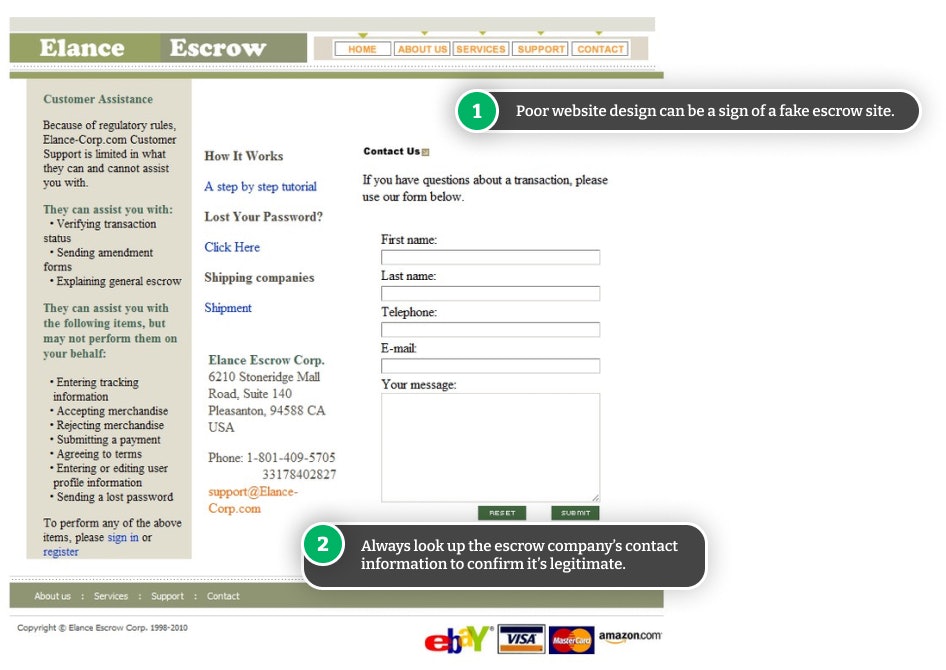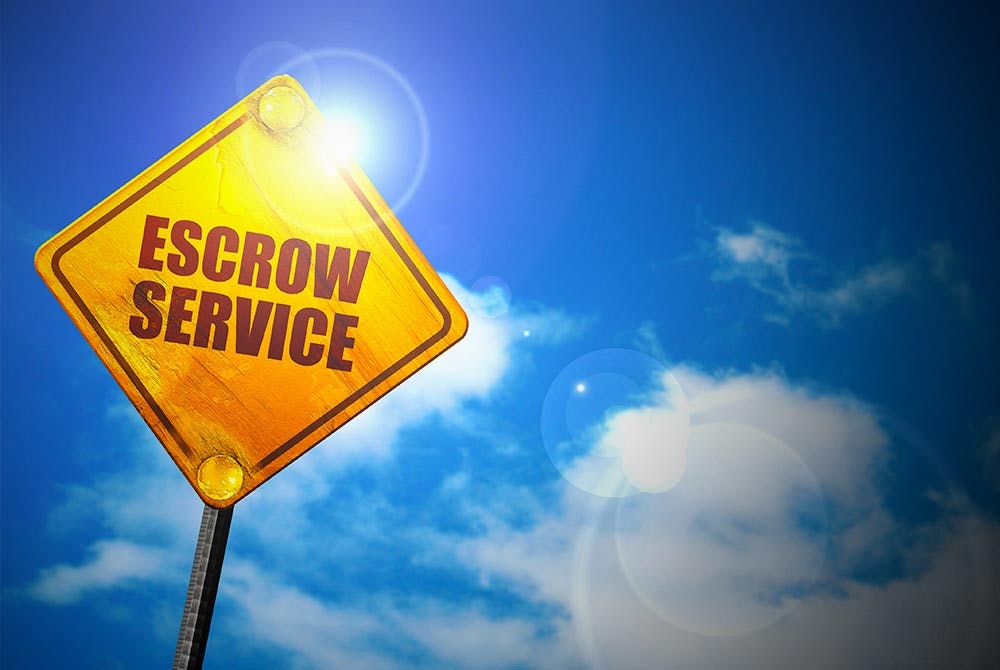- What is the Fake Escrow Craigslist Scam?
- Red Flags of the Fake Escrow Craigslist Scam
- How to Beat this Fake Escrow Craigslist Scam
- Have You Fallen For This Scam?
- Frequently Asked Questions
Craigslist has always had a less-than-perfect reputation, and this fake escrow scam only makes things worse. If someone on Craigslist requests the use of an escrow service to complete the transaction, be sure to do your own research to make sure the escrow company is legitimate and you're not being scammed.
What is the Fake Escrow Craigslist Scam?
In this fake escrow Craigslist scam, scammers will convince you to use an escrow service to provide a “safe” transaction.
Fortunately, this scam is detectable and avoidable, as long as you know what to look for. Here's how the scam works.
You’re in Contact With a Buyer or Seller on Craigslist
This scam begins when a conversation is initiated on Craigslist. You can be either the buyer or seller in this scenario, as the scam works both ways.
They Suggest Using an Escrow Service
The scammer will request the transaction be handled over an escrow service. They'll claim this is a safer way of handling it and recommend an escrow site you can both use for this purchase. They'll likely send a link to the website where you'll start the escrow exchange. If you recommend an escrow service to use, the scammer will not agree to use it and keep pushing their preferred service instead.
Example Communication with the ScammerWe can use this escrow site that is 100% safe and secure. This will protect both of us and money won't be transferred until the transaction is completed. I prefer this site over others because I have used it before and it is safe. I understand you prefer to use Escrow.com, but this site I am recommending is much safer and faster.
Money Is Deposited
If the scammer is pretending to buy an item you’re selling, they will pretend to deposit money in the fake account, or they'll deposit real money in the account—either way, they'll recoup the funds, and you'll never see any of it. The buyer will then claim the money is in the account, and you'll think it's safe to ship the item to them.
If you’re the one buying the item (which doesn’t exist), you deposit money into the fake escrow site to pay for the items.
The Scammer Steals Your Money and/or Item
As the seller, once you see the money deposited into the escrow account, you think everything is fine and ship the item to the buyer (i.e., scammer). What you don’t realize is that you’re unable to claim the money in the fake escrow site, and you’ve shipped the item without receiving payment.
As the buyer, you’ve deposited your money into the fake escrow account, and then you’re unable to contact the seller. You’re also unable to get your money back from the escrow site since it’s fake.
In some cases, the scammer may attempt to steal your item and money from you by pretending to buy your item then requesting a partial refund via wire transfer.
Red Flags of the Fake Escrow Craigslist Scam
This Craigslist fake escrow scam isn't new—scammers have been using fake escrows to steal money (and your information) for nearly two decades. However, they are becoming more prevalent in recent years on classifieds sites like Craigslist, KSL, Facebook Marketplace, eBay, and more.
With social distancing and more transactions taking place remotely, the opportunity for Craigslist scamming is greater than ever.
This scam begins when a buyer recommends using an escrow site for a transaction, so that's the first identifier. Next, you'll want to pay close attention to:
- The website and URL of the escrow site
- Their identity
- The buyer’s request
Double Check the Website and URL
Do your due diligence and look out for fake escrow sites or copycat websites. Escrow.com is a secure escrow site, but many scammers will make lookalike websites mimicking the same logos, copy, and format. For example, their site could be Simple-Escrow.net or WhyEscrow.com. Double-check the URL and other site information to make sure it's the service that you think it is.
Attempt to call the customer service number listed on the website. If you can't reach a live person, that should be an immediate red flag. And if you do get a live person, ask questions to verify their business identity. While you're at it, make sure they have an address listed and verify that the location is legitimate.
For example, here are a few fake escrow services that have been used in Craigslist scams:
- http://safeandsecureescrow.com
- http://securepayescrow.org
- http://trustworthyescrow.info
Verify Their Identity
Ensure the email address of the buyer/seller matches up with their name. Any discrepancies should be a red flag. Try to find the buyer’s social media profiles and ensure the email address they have listed on their profiles matches the one they’re using to make a purchase.
Look at the Buyer's Request
Check to see if the greeting is personal. Lazy scammers may be attempting a scamming campaign at scale, which means they'll likely use generic buying requests. This means their message will probably say something like, "Hi there, I'm interested in purchasing this item," instead of saying the name of the product you're selling.
More targeted scammers may get more personal with their messages, so this isn't the only sign—but it's a quick-and-easy indicator.

Additional Signs to Identify a Fake Escrow Craigslist Scam
The three signs listed above are dead giveaways, but there are other indicators you can look for, too:
- Grammar: Scammers aren't usually writing experts, so look for grammar mistakes on the escrow site itself. A legitimate escrow service will use a content team or hire a professional to write their website's copy—so they'll be of higher quality.
- Buzzwords: Frauds love to use the words "safe" and "secure" in their fake escrow site's name. Be wary if you see this.
- Plagiarism: Use an online plagiarism checker to see if a fake escrow site has copied content from a real escrow service. If they have, then it's a clear sign they're not legitimate.
How to Beat this Fake Escrow Craigslist Scam
Fortunately, beating this scam is simple. First, never click any links a buyer or seller on Craigslist sends you. There's potential they could be attempting to scam you in other ways beyond this fake escrow scam.
If someone demands the use of an escrow, request to be the one who chooses the service. Since they initiated the idea, they should be comfortable with you selecting the appropriate tool for the transactions.
Next, always verify the escrow and use one you're comfortable and familiar with. Someone requesting an escrow for the transaction is not an immediate sign they're a scammer (they may be trying to avoid being scammed)—however, it should be a red flag for you to be more cautious before proceeding.
Escrows can be a safe, secure way to process transactions, so don't begin making fraud accusations from the get-go. Do your research first.
Always Conduct Transactions In Person
When buying or selling items on Craigslist, it's always best to deal in person with cash so money is only handed over once the item has also been handed over. Always be extra careful when the Craigslist buyer or seller is unable to meet in person.
Whenever possible, follow the best practices for avoiding Craigslist scams, which include:
- Dealing locally and face to face only
- Not accepting cashier’s checks or money orders—demand cash
- Avoiding letting third parties (uncles, aunts, friends, co-workers) get involved
- Avoiding shipping or dropping off items
Have You Fallen For This Scam?
If you've fallen for this fake escrow Craigslist scam, don't panic. Follow these steps as soon as possible.
Contact Your Bank
Contact your financial institutions to let them know about the scam. While you may have lost physical goods, it's best to keep these parties in the loop if other financial assets are at risk.
Contact the Authorities
Next, contact the appropriate authorities:
- Craigslist: Craigslist has a list of contact links to get in touch with the appropriate party as fast as possible.
- Better Business Bureau (BBB): Submit your complaint with your local BBB and report any online scams at BBB Scam Tracker.
- Federal Trade Commission (FTC): Submit your complaint online or over the phone at 877-FTC-Help.
- FBI Internet Crime Complaint Center (IC3): Submit internet crimes to the FBI's online division.
These different authorities will also have additional tips and advice to help repair the issue and protect you against further fraud.
Recover Your Goods
If it's not too late, contact your carrier to see if they can stop the delivery of your goods. Most carriers even have fraud investigation departments that will do their part to try and recover the merchandise.


Comments